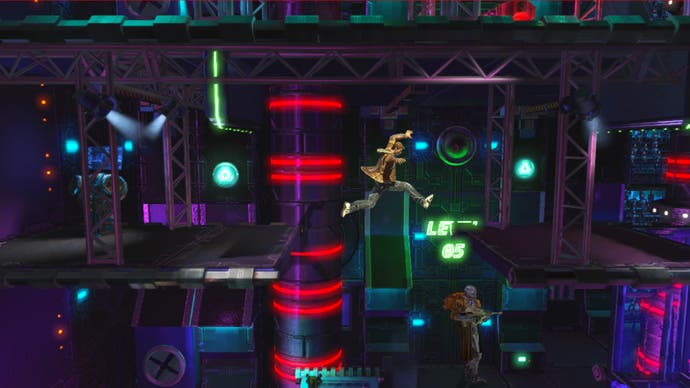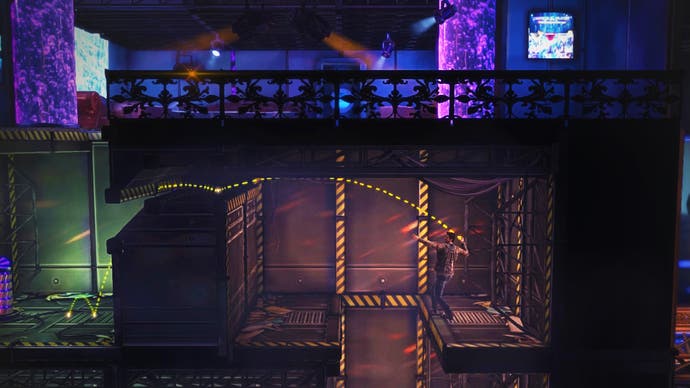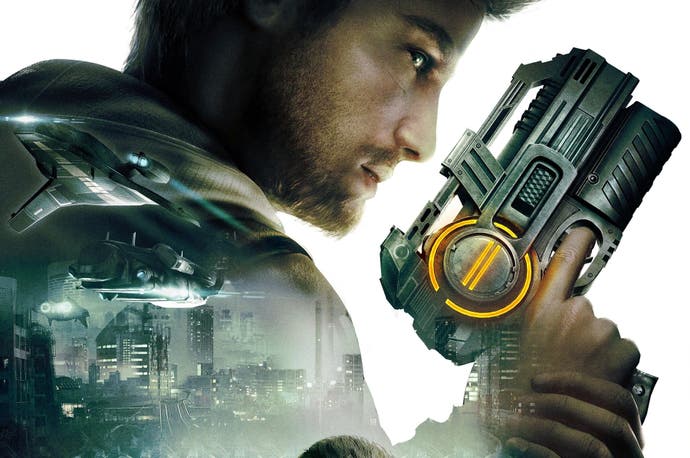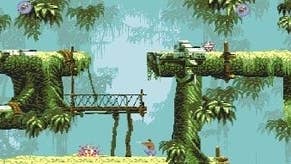Flashback review
The quest for identity.
Flashback's title screen allows you to play through the original 1992 game in its entirety. A generous move on the part VectorCell, developer of this remake, you might think, but the message is obvious: Look how far we've come. The idea is that we have a quick play of the original and then find out what a difference two decades' worth of improvements in game design and technology can make.
The move backfires. The juxtaposition only serves to highlight the failings of this update - and, perhaps, the folly in trying to remake a game like Flashback in the first place. It does, however, make for an interesting case study in how game design has changed over the years - for better and worse.
Let's start with the good stuff, then. New Flashback is certainly a more accessible game than its predecessor. Its difficulty curve is gentler and its controls aren't nearly so fussy. You can clear gaps without having to wait an agonising split second for a gorgeous rotoscoped jump animation to kick in, and you no longer need to press a button simply to unholster your weapon before firing; here, it's just a case of holding the right analogue stick in the direction of an enemy and squeezing the trigger.
And though it may look less distinctive, the visual overhaul is substantial. New Washington benefits from a pristine makeover, teeming with fine future detail, while a return to Earth gives us a fleeting glimpse of a dark, rainy dystopia, all neon signs and flying cars: familiar fare, but nonetheless evocative.

The plot hasn't changed a great deal. We're once again put in the shoes of Conrad B. Hart, amnesiac hero and galactic super-agent, who wakes in a jungle on the moon of Titan, having uncovered a plot by shape-shifting extraterrestrials to take over the Earth. And, as before, it ends up with Conrad visiting the alien planet to finish them off once and for all.
If the narrative is broadly similar, however, the tone is completely different. The original generated an oppressive atmosphere, partly thanks to its fierce challenge, but also because the sparse spot effects and music made its bursts of noisy violence all the more startling. Shots punctured the silence like explosions, each one packing devastating force. Alongside that, its economical use of dialogue helped maintain a strong sense of mystery.
Now the protagonist has a voice, and sadly, he's become Conrad B. Bland, a man with Nathan Drake's haircut and wardrobe but none of his charisma. Just about every utterance saps the game of tension. The original was hardly known for its sparkling wit, but it's a reminder that games are often better off showing than telling.
"I'll thank you when you're dead," says Conrad, with all the menace of a damp towel. "If you don't know who you are, they won't either!" yells an ally, bafflingly. At least Conrad's voice actor has the good grace to sound embarrassed by the wince-inducing attempts at breaking the fourth wall. Meanwhile, black-and-white comic panels manage to confuse what should be a simple story, clumsily introducing a token love interest for Conrad in a truly dreadful scene that sees her sobbing hysterically as he dumps her by phone.
Still, if the execution leaves a lot to be desired, the attempts to flesh out the narrative are an unsurprising concession to a modern audience. As, too, is the difficulty curve, for this is a much easier game than the original. Back then, most players will have seen their first game over within a couple of screens, what with mutants that could take you out in a couple of blasts of their alien shotguns and robots whose circuits could only be frazzled by hitting their extended stun arm.

Now the early danger comes from hovering orb-shaped drones that can be downed easily with two or three shots. An objective marker that guides you to your next destination ensures you'll never get lost (though it can be turned off), while icons let you know which platforms you can climb up onto - a useful idea if only because it's not always immediately clear, particularly once you reach the alien planet and just about everything is purple.
You'll never tiptoe into a new room with the same sense of trepidation you had the original
Elsewhere, the nigh-invisible mines from the first game return, though blundering into them rarely kills you outright as it once did. Besides, you have a pair of molecular glasses - AKA Batman's detective vision - to spot them in advance, along with other hazards and breakable floors. It would be a thoughtful inclusion had the game required you to exercise caution, but you'll never tiptoe into a new room with the same sense of trepidation you had the original. A burst of dramatic music cues up every time an enemy is nearby, with Conrad automatically readying his gun, dissolving any potential tension.
Enemies are little more than a nuisance, at any rate. Flashback's combat wasn't always elegant, but it allowed smart players the opportunity to take down opponents with surgical precision. You could draw your gun, sidestep off a higher platform to land in a crouch, let off a single shot, then turn round and fire once more: two shots, two dead mutants. Here, it's usually a case of blasting away, rolling behind an enemy when spotted and repeating the process until the music stops.
VectorCell hasn't removed insta-death entirely. Falling too far still means game over, as does the touch of a laser beam. It rarely feels as cheap as it might - it's usually a result of your own complacency or foolhardiness - but it's harder to forgive when the cause is sloppy design. A descent to the bottom of a nightclub, for example, saw me die because I hadn't jumped off the elevator while it was halfway down; there was nothing to kill me, the level designers just didn't want me going there. It certainly wasn't the only rough edge I encountered, though the others tended to be more amusing: at one stage, a turret blasted Conrad and he walked backwards across a gap, eventually sitting down on the other side, quite dead.
If such quirks can be blamed on a probable meagre budget, the levelling system is entirely inexplicable. Periodically, Conrad gains skill points to spend on improved gun accuracy or to have charged shots deal more damage, but the effect is barely noticeable, not least because enemies get tougher the further you get. It's seemingly there for no other reason than that so many contemporary games have adopted similar RPG-lite mechanics, with no real thought having gone into its inclusion.
That's something you could never say about the original Flashback, for all its faults. It might have been obtuse, fussy and frustrating, but it had a clarity of purpose and vision that this anniversary edition struggles to match. Time may not have been particularly kind to Flashback, but 20 years on, it hasn't been forgotten. It's unlikely we'll be able to say the same for this remake in 20 days.










